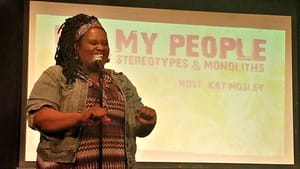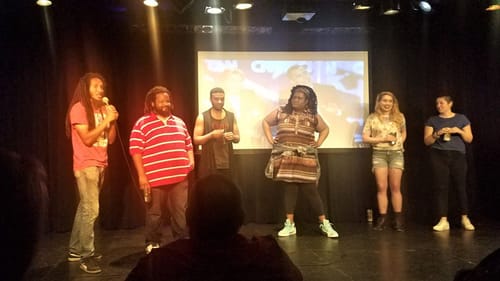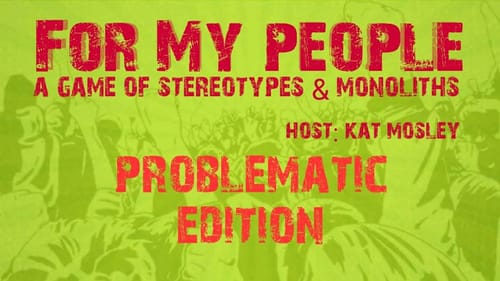Stay in the Loop
BSR publishes on a weekly schedule, with an email newsletter every Wednesday and Thursday morning. There’s no paywall, and subscribing is always free.
Racial stamina onstage
Meet Katonya Mosley and her comedy game show ‘For My People’

Comedian Katonya Mosley is on an empathy training mission with her monthly show, For My People: A Game of Stereotypes and Monoliths, which moves to venues throughout the city.
“How many times are you in a room and you know what just went down isn’t right? And no one advocates for the person who has been hurt?” she asks while discussing her radically inventive game show, which blends entertainment with education.
The people face off
It’s high-intensity diversity training, exposing stereotypes and prejudices. For My People (FMP) begins when Mosley warms up the audience, introducing her "Ally on the Wall" and asking the audience if anyone has any triggers. She then welcomes two teams of comedians, each team representing a different marginalized identity, to the stage. Each comic gets time to explain why they’re qualified to speak for "their people." Then Mosley launches into one question per round, with both sides conferring as a group before answering.
Titles and team names from past FMP shows include “The Battle of the Browns,” “Racism Interrupted,” and “Brothas vs. N*ggas: The White Flight Edition.” Mosley awards points to the team with the most insightful (or most entertaining) answers, and the evening culminates in a confrontation between the winning team and “The White Dudes.”
Building stamina
Mosley’s work experience and educational background give the show a one-of-a-kind structure. Armed with a law degree, mental-health first-aid training, clinical-education knowledge, storytelling and standup-comedy credits, and the firsthand experiences of living as a black woman in America, Mosley guides the audience through a profoundly entertaining simulation that becomes an examination of stamina, both mental and racial.
This stamina comes to mind for black comics, Mosley says, at open-mic rooms. “Frequently, black comedians will just sit waiting for hours… [but] by the time they do go up, they end up shining because the room at 1:15am is so much tougher than it is at 10:30pm.” Weathering that challenge means they’re poised to light up the room in easier environments.
The “kinship” of that stamina is important to her, and it prompted her to create a show that allowed her to observe it live onstage. By creating teams of comedians that identify with each other, groups like "LGBT Non-Binary Comics" or "Black Male Comics" as a whole can connect with one another and answer challenging questions like “Why white women always be crying all the time?”

Manipulated by the millions
FMP is more than a chance for marginalized groups to use their wits to battle each other. The heart of the show was born from an ever-expanding avalanche of global political manipulation. The ease with which people today can be incensed into extreme beliefs prompted Mosley to examine the root causes of prejudice and bigotry.
“One thing that I noticed about where we are politically is that people are easily manipulated,” she explains. “They’re easily Pied Pipered into behaviors that they don’t actually believe in,” with siren calls like “‘that person is the enemy’ or ‘this person is ugly’ or ‘this person is beautiful.’ We’re just so easily controlled, primarily by things we are not allowed to say in public.”
Code switching
FMP relies on comedians showing their vulnerability and saying exactly what they mean while answering prompts from their host. Issues like systemic poverty, white supremacy, an economic history of slavery, and our biased American educational system often emerge as themes during the debates. Critical points are made when tensions rise onstage, and audiences are left breathless as the dust settles and teams rack up their points.
The most recent edition of FMP, titled “Racism Interrupted: A Comedy and Conversation” raised funds for the Gestalt Therapy Institute of Philadelphia. Local therapists were invited to observe the reactions and banter between teams of white women, black men, and white men as they answered challenges posed by Mosley.
“I knew that I had to pack deliberate code switching into it to expose the audience to intelligent code switching. And I knew that I wanted them to see a broader emotional spectrum than they allow themselves to see on a screen,” Mosley says. “I really got to dive into the empathy at that event, which I think that whole show was about. Particularly with therapists, I wanted to strengthen their empathy and get them close to being able to see grief in resilient people of color.”

Learning and growth — for everyone
What began as a comedy show took on a new objective: emotional-stamina training. Mosley brings professional simulator skills, comedic timing, a wide range of medical knowledge, and genuine empathy together through her ever-changing cast of comics. She doesn’t cast a team of white male comics for the purpose of bullying them or having an onstage target for everyone. She describes watching comedians of all backgrounds grow, learn, and shine through the show.
“I am aware that I’m dealing with unconscious white supremacy. Those words are tough for people to stomach,” Mosley notes.
In her 2018 book White Fragility, Robin DiAngelo describes white people’s unconscious absence of racial stamina, but Mosley takes that idea a step further. “What I’ve come to learn is that I forgot to consider the other side of the coin. What’s the corresponding skill? The corresponding stamina is freedom stamina. So when I’m speaking truth to power and dealing with whatever disapproval comes… the more I’m building something. I’m interested in exploring that deliberately and specifically with people.”
Mosley’s 2019 goals for the show are numerous: develop structured trainings, produce more shows, obtain funding, build up a team, and inch closer to her ultimate mission of empathy.
You can catch the next performance of For My People, “Black Women vs. Black Men,” on Thursday, February 28, at 8pm at the Adrienne. Tickets ($5 to $12) are available here.
Sign up for our newsletter
All of the week's new articles, all in one place. Sign up for the free weekly BSR newsletters, and don't miss a conversation.
 Erin Dohony
Erin Dohony